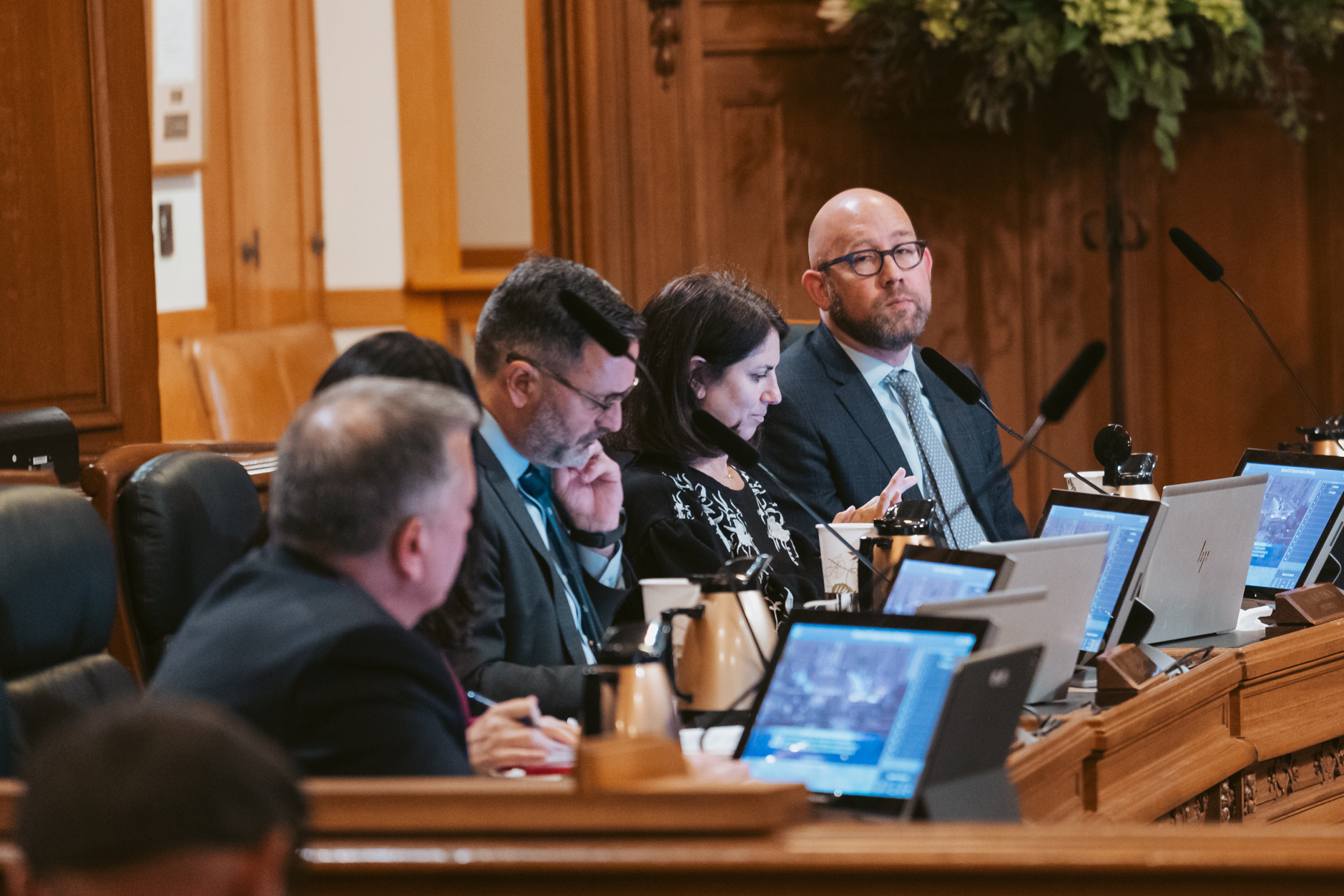The San Francisco Board of Supervisors on Tuesday repealed a law that compels City Hall to boycott a majority of U.S. states. And the supervisors read the riot act to a nonprofit service contractor accused of union-busting.
They also opened the door to renewed debate over the use of robots by police and questioned how the city would cooperate with the deployment of state law enforcement entities to combat the Tenderloin drug crisis.
Best Intentions, No Results: Boycott Law Repealed
Supervisors voted 7-4 to repeal a law prohibiting agencies from doing business with companies based in states with laws that discriminate against LGBTQ+ people, restrict access to abortion or make it difficult to vote. Supervisors Shamann Walton, Myrna Melgar, Connie Chan and Dean Preston dissented.
Authored by then-Supervisor Scott Wiener, in 2016, the law, Section 12X of the Administrative Code, was meant to motivate other progressive cities to leverage their economic power against states that were enacting discriminatory laws, but it never gained traction, despite now applying to 30 states.
Meanwhile, the economic effects of Covid and other issues highlighted the often- prohibitive costs that the law was causing the city to incur, including a recent controversy over million-dollar-plus estimates for park restrooms.
Board members debated the repeal before the vote, with dissenting members arguing that keeping a reformed version of the law was preferable to repeal.
“We can’t make these changes without a plan,” Walton told his colleagues before the vote, fearing that repeal would create “unintended consequences” for local small business contractors.
“I do think that the intent behind 12X was good and correct, but […] it’s not achieving the goal we want to achieve,” Supervisor Rafael Mandelman, chief sponsor of the repeal, told the board. “We have incredible needs for vulnerable populations right here in San Francisco. […] The better we can make San Francisco government work for our folks, the more good we can do.”
Supervisor Hillary Ronen, one of the most progressive members of the board, also supported the repeal.
“What bothers me about 12X is that it’s really easy to symbolically act as if we’re doing something to move the needle,” Ronen said. “But in actuality, not only have we not moved that needle, things are getting worse.”
Melgar also opposed the repeal. Like Walton, she cited concerns for small business contractors.
“There are aspects to this legislation that are valuable to people I care about, the [local business enterprise] community, small businesses,” Melgar said. “Do I think it will make things easier to administer, cheaper? Yes. But are we ready for it? I’m not quite sure.”
Nonprofit Grilled Over Alleged Union-Busting
The board also held a special hearing on labor issues at the Felton Institute, a behavioral health nonprofit that has tens of millions of dollars in contracts with various city human services departments, including six programs it recently took over from the United Council of Human Services, another organization in serious hot water with the city.
The nonprofit has been accused of aggressive tactics against underpaid and overworked personnel looking to expand union representation, including retaliatory discipline, harassment, surveillance of workers, calling police on organizers and hiring Jackson Lewis, a law firm notorious for union-busting.
Managers from the Felton Institute, including Chief Operations Officer Yohana Quiróz, testified that they were limited in their capacity to answer questions due to ongoing mediation.
Meanwhile, Felton Institute employees and union representatives, including Service Employees International Union 1021 leader Theresa Rutherford, reiterated their complaints, with Rutherford telling the board that the nonprofit was using a “culture of disenfranchisement” against workers.
Understaffed programs were being forced to “ration care,” according to workers testifying at the hearing.
Board President Aaron Peskin commented that ongoing labor issues at the Felton Institute “had reached a critical point” and the nonprofit needed “to get its act together.”
“If we have another one of these hearings, there will be severe consequences,” Peskin added, while other supervisors, including Ahsha Safaí, argued for new legislation that would mandate better compliance with labor requirements in contracting.
Police Drones for Sideshows, Tenderloin CHP Deployment Questioned
In other notable actions, supervisors addressed continued public safety issues during roll call.
Mandelman announced that he, along with colleagues Melgar, Safaí, Matt Dorsey and Catherine Stefani, will ask the city’s Committee on Information Technology to work with the San Francisco Police Department on a policy for deploying aerial drones against illegal sideshows.
“SFPD needs every tool available to make our streets safer, and this sensible policy change to allow the use of drones to identify and later impound involved vehicles will help us take back our streets,” Mandelman said in a roll call speech.
The move is also supported by District Attorney Brooke Jenkins, who noted in a statement that “using unmanned aerial drones to safely monitor and gather evidence against dangerous sideshow drivers is a common-sense solution that will deter this dangerous behavior and provide useful evidence that will assist in prosecution.”
According to that release, SFPD is currently limited to using drones “in narrow circumstances such as search and rescue.” The city last flirted with expanding police use of remotely piloted vehicles, including equipping them for the use of lethal force in the most dire circumstances, last December. The draft policy was then sent back to committee after a public outcry from civil rights groups.
Additionally, Preston announced that he was sending letters of inquiry to Mayor London Breed, District Attorney Jenkins and other departments on how they will be working with the planned deployment of the California Highway Patrol and National Guard to combat the fentanyl epidemic in the Tenderloin.
“Deploying the military to a city neighborhood is a serious matter with many legal and policy implications, and the announcement that this may be happening should not be taken lightly,” Preston said.
